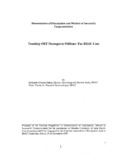| dc.contributor.author | Sarkar, Sukhendra Kumar | |
| dc.contributor.author | Karim, Fazlul | |
| dc.date.accessioned | 2020-01-08T05:26:37Z | |
| dc.date.available | 2020-01-08T05:26:37Z | |
| dc.date.issued | 2000-11 | |
| dc.identifier.citation | Sarkar, S. K., & Karim, F. (2000, November). Teaching ORT messages to millions: the BRAC case. Research Reports (2000): Social Studies, Vol – XXV, 1–12. | en_US |
| dc.identifier.uri | http://hdl.handle.net/10361/13427 | |
| dc.description.abstract | This secondary data based paper aimed to familiarise the audiences on BRAC experience
in successful interpersonal development communication at grassroots. Starting with some
basic conceptual issues of communication the paper focused mainly on the BRAC
foregone Oral Therapy Extension Programme (OTEP). Through the OTEP BRAC health
workers taught miIIions of rural women the "Seven Points to Remember' on diarrhoea
and its home management. The reason for adopting this strategy among the many options
was that most of the rural mothers were illiterate and superstitious. Therefore, to dispel
wrong traditional beliefs and values of the learners, face-to-face teaching was proved to
be instrumental and effective. Prior to launching the national programme BRAC,
however, experimented a pilot in its SuIIa project. Based on the pilot experience BRAC
developed a concise but comprehensive messages on diarrhoea including homemade
therapy for its management. The BRAC trained mobile Oral Rehydration Workers taught
at least one woman from each household the "Seven Points to Remember" staying at
temporary residences given by the community. 'Different fora such as meetings in
schools, madrashas, mosques, bazaars and villages were conducted to raise awareness of
the male population. Apart from these, mass media were used to disseminate messages.
Another vital forum was meeting with the village doctors to win their support to the
programme. However, a two-tier mechanism was in place for quality control viz; i)
ongoing monitoring system, and ii) operations research and evaluation. The paper also
delineated some tips for the Pesticide Association of Bangladesh so that by capitalising
the BRAC experiences it can launch interventions to raise peoples' critical awareness on
the entirety of pesticide to prevent environmental hazards . | en_US |
| dc.language.iso | en | en_US |
| dc.publisher | BRAC Research and Evaluation Division (RED) | en_US |
| dc.subject | BRAC | en_US |
| dc.subject | Oral Therapy Extension Programme (OTEP) | en_US |
| dc.subject | Health workers | en_US |
| dc.subject.lcsh | Health surveys | |
| dc.subject.lcsh | Public health | |
| dc.title | Teaching ORT messages to millions: the BRAC case | en_US |
| dc.type | Research report | en_US |

